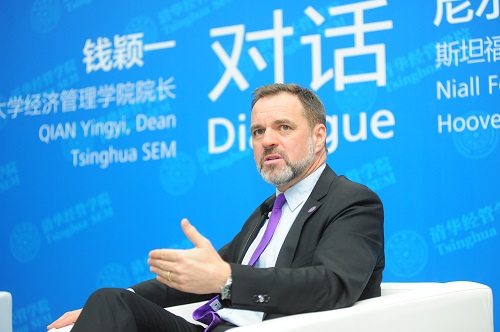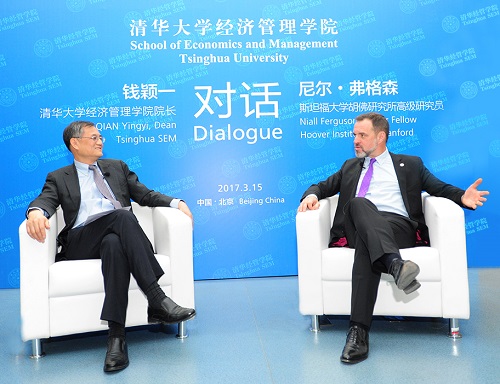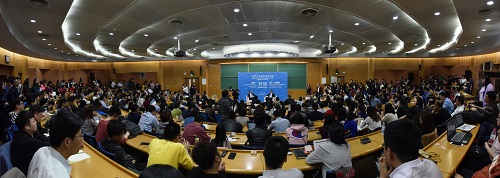Qian Yingyi,
Dean of the Tsinghua School of Economics and Management, and Niall Ferguson,
Senior Fellow at the Stanford-based Hoover Institution, held a dialogue which
focused on the economic, cultural, and political implications of the 2016 U.S.
election of Donald Trump as President.
The two
economic thought-leaders addressed a number of topics relevant to the evolving
world order, including political shifts in Great Britain and the United States,
an assessment of President Trump’s true reach in terms of power and influence,
potential results of Trump’s first term in office, and implications of his
presidency for China and the rest of the world.

The discussion
began with an overview of what Ferguson referred to as a “mood of
disillusionment” within Great Britain and the United States which reverberates
throughout the world. Ferguson first notedBrexit, Britain’s separation from the European Union (EU), occurring as a result
of the EU’s inability to cope with its recent financial crisis and the mass
migration of refugees from surrounding war-torn countries, notably Syria,
Afghanistan, and Iraq, into Europe. In addition, Ferguson highlighted the
growing divide between global elites and non-elites in both Great Britain and
the U.S., noting the misjudgement of political experts who wrongly predicted
theBrexitoutcome and the election of President Trump due to a
disconnect from the everyday experiences of common people.
With bothBrexitand the election of Donald Trump occurring at such narrow margins, the
perception was that of populations willing to take a chance on alternatives
which may not reflect the established rule of order. Ferguson echoed this
sentiment of public awareness held by Dean Qian and many in attendance, noting
that “narrow decisions have big consequences.” This diversification of public
voice spoke to not only the impact of economic globalization, but also a
cultural globalization that promotes a multiculturalism in thought and practice
that many world powers have yet to fully accept.
With President
Trump’s rhetoric causing an uproar in the media, Dean Qiao and Ferguson took a
moment to focus on the President’s true political power and where he stands to
make the largest political and economic impact. Both scholars highlighted the
areas of tax reform, healthcare reform, and deregulation as being within
Trump’s immediate control, with Speaker of the House Paul Ryan and other
members of Congress dictating the overall economic plan which requires the
checks and balances of U.S. government. Dean Qiao noted U.S. tax reform as
being the most critical area for the health of the global economy, with the
creation of the right formula for corporate tax and income tax producing
results that support producers and consumers across the world. Both Dean Qiao
and Ferguson leaned heavily into the Border Adjustment Tax, noting that it must
create an upward adjustment in the U.S. dollar to boost consumerism. Dean Qiao
cautioned that the difficulties of tax reform could result in an increased U.S.
budget deficit, albeit temporarily.

The
controversy surrounding Trump’s election and his First 100 Days decision-making
leads many to consider how long he will serve as President. Dean Qiao and
Ferguson shared various scenarios which could result in prolonged success for
Trump and a potential second term. Ferguson noted that the combination of tax
reform, deregulation, and investment into U.S. infrastructure could boost the
U.S. economy. He reinforces this by noting President Trump’s commitment to
advocates of Keynesian economics who believe in more private sector
intervention and corresponding public sector support to boost jobs and
spending. This hands-on approach, according to Ferguson, could lead to growth
and increased support for Trump around mid-term elections.
The discussion
noted many Trump-led factors which may result in his re-election, but there
were also outside considerations. One notable area was the Democratic Party’s
ability to deal with its own inefficiencies and field a viable presidential
candidate. Ferguson noted that the party’s avoidance of self-destruction could
have huge implications on the longevity of President Trump’s administration and
its decisions which implicate the global community.

Dean
Qiao and Ferguson concluded their dialogue by focusing on such implications,
which highlighted China’s entry into the World Trade Organization in 2001 and
the unprecedented growth the country has experienced under free trade. Ferguson
noted China as the principal beneficiary of globalization, stating that the
nation has gone from “marginal to the second largest in the world.” Ferguson’s
closing remarks centered around unity, noting that Trump’s election will lead
to more collaboration amongst the United Nations Security Council and other
groups for the purpose of maintaining and balancing international order.